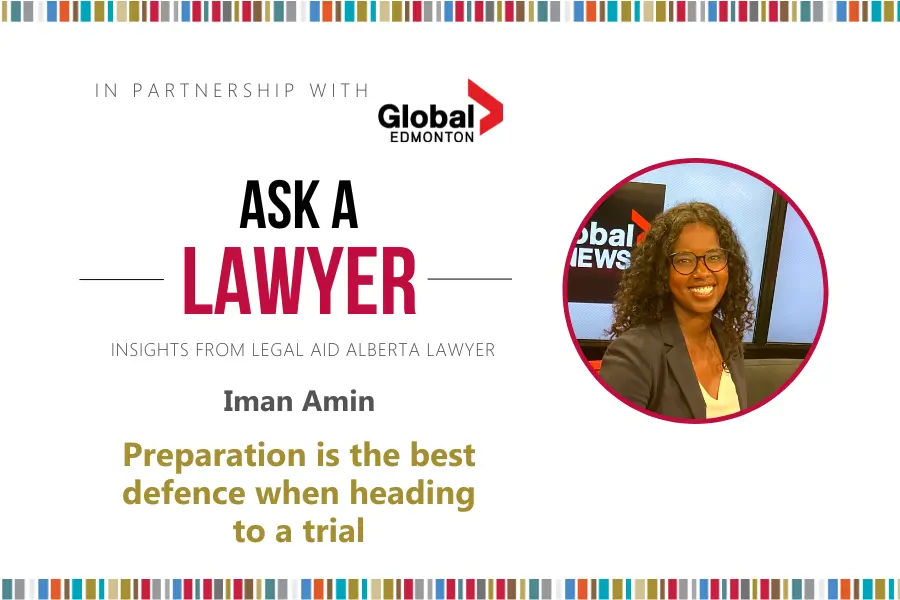Legal Aid Alberta’s experienced lawyers break down the work and planning necessary for a proper defence.
Courtroom dramas on TV or in the movies don’t tell the full story. In real life, there is an incredible amount of research and planning required for a lawyer to defend someone in a trial.
Legal Aid Alberta lawyers have the experience required to deliver the best defence and ensure the rule of law is followed and applied fairly. LAA staff lawyer Iman Amin gets into the details of this work on the Edmonton Global Morning News.
View the Ask A Lawyer segment:
Transcript of program:
Vinesh Pratap: We’ve seen countless courtroom dramas on TV and the big screen where the story reaches a courtroom showdown. But of course as we know, there’s fiction and there’s fact. So what’s really involved when a lawyer defends you in court? Here with us today to explain the detailed planning and work that goes into a criminal trial is Iman Amin, who is part of Legal Aid Alberta’s Criminal Trial Group.
Thank you so much for being here this morning.
Iman Amin: It’s great to be here.
Vinesh: So thank you so much this is a great lesson when it comes to the defence of clients. So, what is involved in defending someone in a trial? Where do you begin?
Iman: Typically clients who are in these situations are dealing with very difficult personal circumstances and you don’t want to waste a lot of time, you want to give them the best advice possible as to their options and what to expect laying ahead, so to do that we first get a copy of the prosecution’s disclosure – disclosure is a collection of the evidence used to support a charge so that can include police reports, pictures, videos, statements. We look through the disclosure and determine whether any of the allegations reveal a breach of a clients’ rights under the constitution, we consider what witnesses might be called to testify to defend the client, we determine whether any experts will be necessary to provide any testimony to defend an accused, we consider and research similar cases and how those have played out in the past and we consider plea options: whether a trial would be run be run by a judge alone or a judge and jury.
Vinesh: So let’s expand on that. How do you decide whether you want to go with a judge alone or a judge and jury?
Iman: Experience goes a long way in making that decision. It is a big decision. Typically, you want to consider whether an average juror is going to be sympathetic to your client (and) how technical your case is. Sometimes juries aren’t best for very complicated, technical cases involving a number of experts. Typically, juries are best for cases involving relationships perhaps romantic relationships or family dynamics.
Vinesh: OK, something where it is a bit more personable, I guess.
Iman: Yes.
Vinesh: OK I want to talk about obviously the Crown submits a lot of evidence through disclosure, but can evidence then be used to help a defendant?
Iman: It certainly can. An experienced lawyer will consider not just the allegation, but the context. For example, if a person is charged with assaulting another person, but it appears the complainant, the person who is alleged to have been assaulted, is twice the size of your client or may have carried a weapon, or may have struck your client first, or is a person of authority, perhaps there is a history of abuse or violence among the parties that’s relevant. All of that can be evidence that your client may have been acting in self-defence.
There may also be other relevant factors at play, like mental health, that aren’t included in the allegations.
Vinesh: How does a person’s mental health affect things?
Iman: Someone’s mental health is very relevant in determining whether a crime has occurred.
An experienced lawyer who has experience working with people who are struggling with mental health and understand the challenges that mental health issues can pose for an individual’s life is in the best position to go before a justice and explain perhaps that an individual’s behaviour, while problematic, is a result of an illness and the criminal justice system is not there to criminalize individuals for having illnesses, especially if their behaviour is the cause of that.
Vinesh: OK and just to – finally going back to the whole we see legal issues through the TV drama perspective, in real life it takes a long time – it doesn’t happen just like that right?
Iman: It does not, no. Cases are complicated and there are a number of steps, procedural steps, that need to be taken in advance of a trial so it can take a significant amount of time to sift through the disclosure and properly prepare for a trial.
Vinesh: I learned that covering court through reporting here. Thank you so much for coming here and just shedding light on the role lawyers play in defending clients. It’s greatly appreciated.
Legal Aid Alberta lawyers specialize in family law, child welfare, domestic violence, immigration and youth and adult criminal law. If you have a question for a lawyer you can send it to [email protected]


